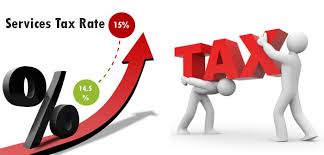
Service Tax is a tax imposed by the central government of India on service providers on various service transactions; however, ultimately it is borne by the customers. The concept of service tax was brought into existence in 1994 by the then Prime Minister Manmohan Singh, terming such tax as an indirect tax levied under Ministry of Finance.
In this system of taxation, the service provides the tax and then recovers it from the customers. Such tax is charged to companies on accrual basis while to individual service providers on a cash basis. The scope of the Service Tax applies to the value of services provided is more than Rs. 10 lacs in a financial year and is geographically applicable to the whole of India except Jammu and Kashmir.
Service Tax aims at lowering the burden of taxation on businesses and individuals on the part of the government. Every service provider in India (except J&K) has to register itself if the value of such services is more than Rs. 9 lacs during a year, but the tax is payable only when the accumulative amount in a year is more than Rs. 10 Lacs.
The Finance Act 1994 has set guidelines or rules for the assessment and collection of service tax in India:-
Rule 1:- Short Title and Commencement
The Central Government’s rules to assess payment of service tax, the returns, and collection, known as service tax rules have been in effect since July 1994.
Rule 2:- Definitions
All the frequently and commonly terms are defined by the service tax rules including terms such as:
‘Act’- referring to the Finance Act 1994.
‘Assessment’- the self-assessment of service tax by the assessee and re-assessment
‘Person liable for paying tax’- referring to the recipient of services who will pay the tax ultimately.
‘Quarter’- Service Tax divides the financial year into four quarters of 3 months each
‘Rent’- this refers to the services provided by renting of immovable property.
Aggregator’- refers to a person who owns and manages a web-based software application enabling potential customers to connect with service providers.
‘Brand name/trade name’- this refers to a name, be it registered or not, that is used to indicate a connection, in the trade course, between a service and a person using that identity to avail the service.
‘security service’- relating to security and property.
Rule 3:- Appointment of Officers
The Central Board of Excise and Customs (CBEC) is empowered to appoint central excise officers. Unlike VAT which is Continue Read...

No comments:
Post a Comment